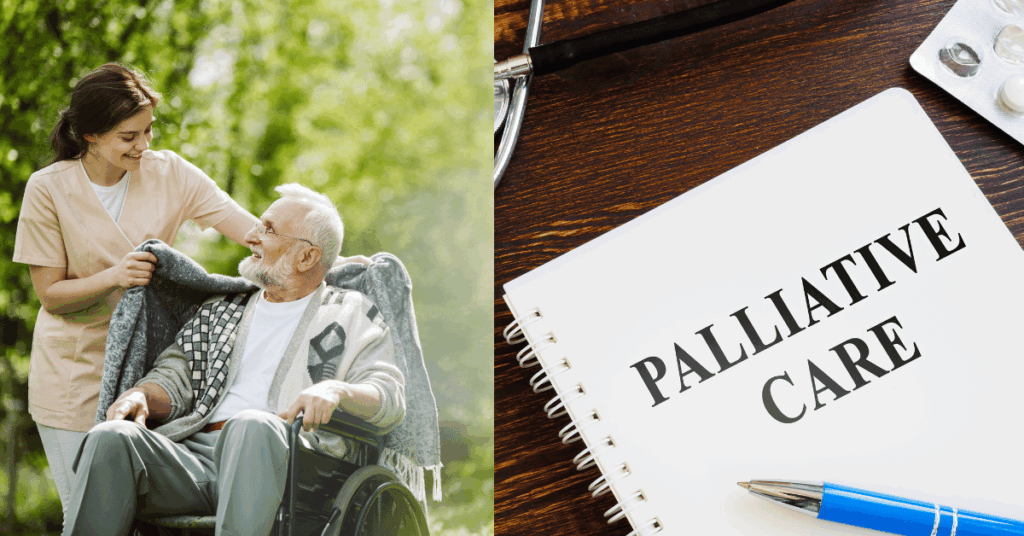What comes to mind when you hear the words palliative care? Do you think of it as care for people who are nearing the end of life—or as something that means there’s no more hope?
If so, you’re not alone.
Many people—family members and even some professionals—carry the idea that palliative care is only for the final days. However, research indicates that this is a common misconception.
A study published in the Journal of Palliative Medicine found that among U.S. adults who reported some knowledge of palliative care, 44.4% automatically associated it with death, and 38.0% equated it with hospice care. This highlights a widespread misunderstanding, as palliative care is designed to improve the quality of life for individuals at any stage of a serious illness, not just at the end of life. Palliative care is not about giving up.
What is Palliative Care?
Palliative care is specialized medical care aimed at relieving symptoms, pain, and emotional stress caused by a serious illness, at any stage of the disease. Its main goal is to improve the quality of life for both the patient and their family.
A team of healthcare professionals—including doctors, nurses, social workers, and end-of-life doulas—work together to support the patient alongside their other doctors. This care is suitable for people of all ages and can be provided alongside treatments aimed at curing the illness.
The palliative care team collaborates with the patient, their family, and caregivers to create a care plan that meets the patient’s specific needs, preferences, and values. The focus is on managing symptoms like pain and fatigue, while also addressing emotional, psychological, and spiritual well-being.
Palliative care can be provided in various settings, including hospitals, care homes, hospice centers, or even at home. Wherever it’s given, the goal remains the same: to alleviate suffering and enhance quality of life.
Understanding Nutrition & Hydration in Palliative Care
In the earlier stages of palliative care, providing nutrition and hydration support can help boost tissue repair, general well-being, and prevent infections. However, as the body naturally begins to slow down in the final stages of life, the ability and desire to eat and drink often diminish. At this point, it’s common to experience physical difficulties with eating and drinking, and a reduced need for food.
Ethical Considerations
Withholding or withdrawing artificial nutrition and hydration (ANH) from patients is often a complex ethical decision for both physicians and family members. While some may view withholding food and fluids as denying basic care, it’s important to recognize that, near the end of life, ANH is unlikely to prolong life and can potentially lead to medical complications and increased suffering. In such cases, less invasive measures, such as good mouth care or providing ice chips, may alleviate thirst without the need for artificial interventions.
Ultimately, the decision to provide or withhold nutrition and hydration in palliative care is a person-centred approach, considering the patient’s preferences, the potential benefits and burdens of such interventions, and the overall goals of care. It’s essential for healthcare providers to engage in open discussions with patients and their families to ensure that care aligns with the patient’s values and desires, promoting comfort and dignity in the final stages of life.
The Role of Morphine in Palliative Care
Morphine is commonly used in palliative care to relieve pain and ease breathing difficulties, especially in advanced illness. Its purpose is to improve comfort and quality of life, not to hasten death. Doses are carefully tailored to each person’s needs, starting low and adjusting as necessary to manage symptoms like pain and breathlessness (also called “air hunger”), while minimizing side effects such as drowsiness or nausea.
Families sometimes worry about the use of morphine, particularly near the end of life. It’s important to know that in palliative care, morphine is used thoughtfully and compassionately to ease suffering. When properly managed, it provides significant relief, helping individuals live their remaining time with as much comfort and dignity as possible.
What Caregivers and Professionals Need to Know About Palliative Care
Palliative care is a collaborative effort between healthcare teams, patients, and families. Open communication ensures that physical, emotional, and spiritual needs are met with compassion and respect for the person’s wishes.
For family caregivers, palliative care also provides critical support—respite, emotional guidance, and practical resources—so you don’t have to walk this journey alone. Asking for help is not only okay; it’s necessary for your well-being.
Advocacy is one of the most important roles you can play. Your insight into the person’s unique needs and preferences helps guide the care team to deliver truly personalized, meaningful care.
Palliative care isn’t only for the final days. A “palliative approach” may be used months or even a year before active dying, focusing on comfort, planning, and quality of life throughout the illness. Support is available at every stage.
Empowered Caregiving
Empowered caregiving is about stepping into your role with confidence, compassion, and strength. It means being fully present for the person under your care, understanding their needs, advocating for their comfort, and ensuring their dignity is maintained. By gaining a deeper understanding of palliative care, you can make informed decisions that honour the person’s wishes and bring peace to their final stages of life.
You become not just a caregiver, but a partner in their care, contributing to a journey that respects their humanity and brings them comfort.
Empowered caregiving is not about perfection—it’s about being present, staying engaged, and embracing the role you’ve taken on with an open heart. You are providing more than just physical care; you are offering emotional, psychological, and spiritual support that helps the person you are caring for feel seen, heard, and loved.
At Dementia Solutions, we are here to walk beside you every step of the way. We provide the tools, knowledge, and support to help you feel empowered in your caregiving role, so you can offer the best care possible and find strength and peace within yourself as you do.
At Dementia Solutions, we’ve made it our mission to demystify dementia behaviour and continue to explore person-centred, creative, non-pharmacological solutions to manage dementia-related behaviours. We believe that awareness creation and skill-building through education is the most effective and powerful tool we have to promote and maintain the well-being of both the person with dementia and their caregiver.
If you’re a professional caregiver, consider becoming a Certified Dementia Care Provider!
Ready to deepen your understanding and be confident in your skills in managing changed behaviours due to dementia? Register for our Certified Dementia Care Provider program today and learn how to communicate with compassion, navigate challenging behaviours, and provide the best care for individuals living with dementia. Gain the tools you need to make a meaningful difference in the lives of those you care for. Sign up now and start transforming your caregiving approach!
If you’re a Family Caregiver, we invite you to join our Dementia Solutions Family Membership!
As a family caregiver, you don’t have to navigate the challenges of dementia alone. Join our Dementia Solutions Family Membership today and gain access to expert guidance, practical tips, and a supportive community of caregivers just like you. With resources, real stories, and valuable tools, we’re here to help you provide the best care while maintaining your well-being. Sign up now and take the next step toward confident, compassionate caregiving!
Any questions, simply send us an email at Info@DementiaSolutions.ca , and we’ll guide you through everything our programs have to offer. We look forward to helping you take the next step in your caregiving journey!
If you need support in your caregiving experience or would like to learn more about our educational opportunities, please reach out to us at Info@DementiaSolutions.ca and we would be more than happy to support you.
DISCLAIMER:
The contents of this blog are provided for information purposes only. They are not intended to replace clinical diagnosis or medical advice from a health professional.



